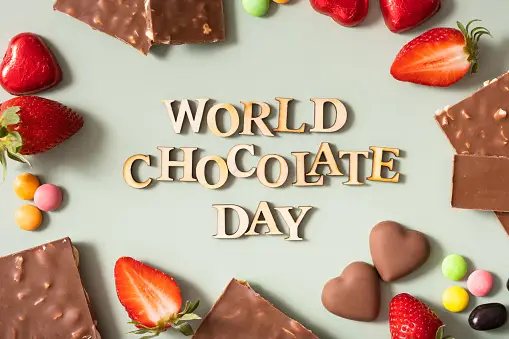Dr. Franz Messerli of
Columbia University is the one who has linked eating chocolate to winning Nobel prizes.
According to his research there is "an incredibly close relationship
between chocolate consumption" and the "number of Nobel prize
laureates per capita"
Interesting!
On this World Chocolate day let us try to guess and find the link between chocolates and
writers.
Inspiration: Chocolate has been known to stimulate
creativity and inspire writers. Many writers indulge in chocolate to enhance
their mood and find inspiration for their writing. The rich flavors and
textures can spark imagination and help overcome writer's block.
Comfort and Reward: Writing can be a solitary and
challenging pursuit, and chocolate can serve as a comforting and rewarding
treat for writers. It provides a sense of pleasure and satisfaction, acting as
a small reward for their hard work and dedication.
Rituals and Habits: Writers often develop unique rituals and
habits to create a conducive writing environment. Incorporating chocolate into
their writing routine can become a cherished ritual. It can be a cup of hot
cocoa while brainstorming, a piece of dark chocolate as a writing snack, or
even a chocolate treat to celebrate completing a writing milestone.
Historical Connection: Chocolate has a rich historical
connection with writers. Many famous authors, such as Roald Dahl and C.S.
Lewis, have expressed their love for chocolate in their writings. Referencing
chocolate in literature and associating it with writers creates a nostalgic
connection for readers and writers alike.
Sensory Experience: Writing often involves invoking sensory
experiences through words. Chocolate provides a unique sensory experience with
its aroma, taste, and texture. Writers can draw inspiration from the sensual
aspects of chocolate and incorporate them into their descriptive writing,
engaging readers on a deeper level.
Social Symbolism: Chocolate is often associated with social
gatherings, book clubs, and literary events. Writers can connect with their
readers and fellow writers over a shared love for chocolate. It can serve as a
bonding element during book signings, writing workshops, or informal meetups,
fostering a sense of community among writers.
Metaphorical Potential: Chocolate can be a metaphorical tool
in writing. Its various forms and flavors can symbolize different emotions,
experiences, or themes. Writers can use chocolate as a literary device to
convey ideas, create metaphors, or add depth to their storytelling.
Cultural Significance: Chocolate has cultural significance
in different societies around the world. Exploring the cultural aspects of
chocolate can inspire writers to delve into themes of tradition, identity, and
heritage. It can also provide insights into diverse perspectives and
narratives, enriching their storytelling.
Exploration of Pleasure: Writing and chocolate both offer a
form of indulgence and pleasure. Writers often aim to captivate readers and
evoke emotions. By exploring the pleasurable aspects of chocolate, writers can
tap into universal experiences and create relatable and enjoyable narratives.
Unique Characters and Settings: Chocolate-related characters
or settings can add intrigue and charm to a writer's work. A chocolatier
protagonist, a whimsical chocolate factory, or a mystical chocolate-based world
can provide a unique backdrop for storytelling and captivate readers'
imaginations.
Do have a bar of dark chocolate and keep writing .



No comments:
Post a Comment